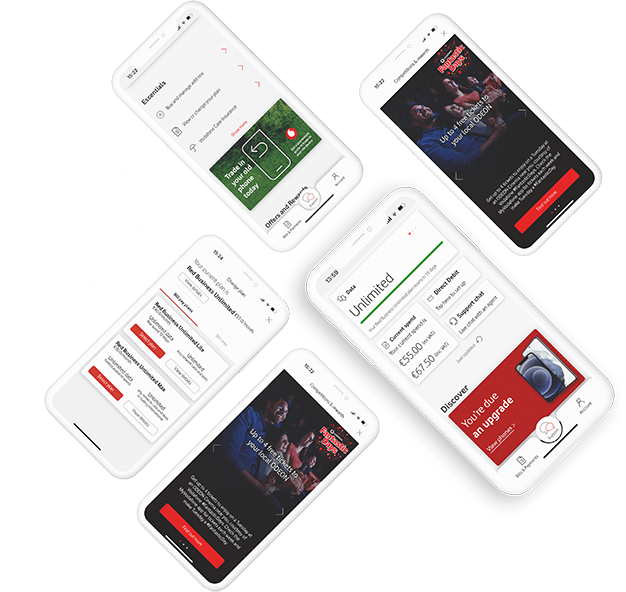
I need support with ...
Shopping on Vodafone.ie
Is it safe to shop on vodafone.ie?
Why do I need to verify my purchase with 3D Secure?
Certain banks require you to authenticate your identity before you can complete your online transaction.
3D Secure is a free and automatic online security service that has been created to help guard you against unauthorised use online. 3D Secure works by using a password that you create as your unique online identifier. You then use your 3D Secure Password to validate online transactions on Vodafone.ie. Get more details on 3D Secure.
How do I know if my payment was successful?
Is my personal information secure on My Vodafone website?
Yes! When you sign in for the first time on My Vodafone you’ll need your mobile phone to receive a verification code. You will also need to set up a unique password that meets certain security levels. Try using a combination of characters, numbers and upper/lower case letters when setting it up.
Bill pay customers also need their self-service PIN to access confidential information such as your latest bill. Remember, this code is different to your password. It's made up of the last four digits of your customer number.
If you need more information on how your details are kept secure read the Vodafone.ie terms & conditions.
I'm not sure if I should register my bank card online?
Registering your credit or debit card on My Vodafone is not only safe it makes your transactions much easier. Vodafone employs industry standard security procedures to prevent unauthorised interception of credit or debit card information in transit.
Vodafone’s security procedures also include the storage of your credit/debit card information which is used for processing your payments. This service is protected by means of a password protected security system that prevents third parties viewing your billing information.
Authorised users should not share this password with any third party. You will have five opportunities to enter correct log-on details. If incorrect details are entered, access to the service will be denied for 24 hours.
Learn more about Vodafone online security here.
How can I contact Vodafone about data protection queries?
If you have a query about Vodafone’s Data Protection Policy or practices you can email us at dataprotection.ie@vodafone.com or write to us at:
Data Protection Officer,
Vodafone Ireland Limited,
MountainView,
Leopardstown,
Dublin 18.
For information regarding access to your information please the Vodafone privacy policy.
How can I keep my information secure while using the Internet?
We want you to feel safe and secure when you're using the Vodafone website. Follow these top tips and protect yourself against online fraud.
1. Register your details online
When you sign up to My Vodafone make sure you have your phone ready because you’ll need it to receive a verification code. Once you’ve received the code by text message you can create your very own password. This will ensure that your personal details are kept safe so only you can access them. Keep this password safe and don't share it with anyone else.
2. Forgot your password?
If you’ve lost or forgotten your password you can create a new one using My Vodafone. To make sure this process is secure you’ll need your phone to receive the verification code. No one can get this code, or change your password, without being able to read the text message. Once you receive it you’ll have 15 minutes to register a new password before the code expires.
3. Change your self service PIN
Bill pay customers need their self-service PIN (SSP) to access private details like their monthly bill or to make a payment. It’s made up of the last four digits of your customer number and can be found on any Vodafone bill. To protect yourself against fraud or theft we suggest that you change your self service PIN once you register.
4. Install anti-virus software on your PC or Mac
To make sure your online experience is safe for all the family we recommend that you install anti-virus software on all your personal computers. Vodafone PC Protection guards against all computer viruses and dangerous programs including worms, trojans, rootkits and zero-day attacks. It also offers parental control so you can monitor your kids’ Internet usage. Learn more about this great service.
5. Activate your pop up window blocker software
Pop up windows can be really annoying when you're online and trying to get something done. Most pop ups are just online advertising tools trying to attract web traffic and can appear when you're browsing or even if you're not browsing at all! The good news is that most Internet browsers include pop up window blockers in the software. We recommend that you leave this turned on at all times to be protected against Internet viruses and fraud.
6. Be aware of fraudulent emails
If you receive an email asking you to validate personal or financial information please delete it straight away. You may even be asked to click a link or download an attachment. Make sure you don't open the link or any documents contained in these messages!
Vodafone NEVER asks customers to send login details or financial details through email.
What is the difference between HTTP and HTTPS?
Have another question about shopping on Vodafone.ie?
Fraud
What can I do to protect myself from fraud?
What is fraud?
Each year, more than 100,000 people are targeted by online criminals who steal people's personal details to commit fraud. This can involve:
- Taking out credit cards in your name
- Using your personal details to take over your existing accounts
- Changing the details of your personal accounts, so you can't access them
What types of fraud are there?
- Identity theft (also known as impersonation fraud) – using someone's personal details (like name, date of birth, current address) to obtain goods and services fraudulently
- Identity fraud – using someone's personal details to obtain goods or services by deception – with stolen documents like a passport or driving licence
Should I be worried about identity fraud?
If a fraudster gets hold of an individual's personal details, they could do things like open a credit card account in their name – so it's really important that your personal details are protected. That's why we have strict security measures in place to stop this from happening. There are also a few simple things you can do to help.
What can I do to keep my identity safe?
You can reduce the risk of your details being stolen by keeping your personal details to yourself. Just follow our simple steps to increase your chances of staying safe:
- Check the validity of anyone asking for your personal information – whether by phone, face-to-face or over the internet. If you're not sure, don't give them your details
- Check your bank, credit card and other financial statements for anything you might not have bought yourself
- Limit the amount of personal information you share on social networking sites – and make sure you have privacy settings in place
- Never share your passwords or PIN numbers with other people and make sure they're not easy to guess
- Shred any documents that contain your personal details before you throw them away
How to spot identity fraud
- Bills, invoices or receipts addressed to you, for goods or services you haven't ordered
- Letters from solicitors or debt collection agencies about debts that aren't yours
- Letters or statements for bank accounts you didn't open
- Transactions appearing on your bank statements (normally cash withdrawals) you don't recognise
- New accounts showing up on your credit report
- Documents that have gone missing – like your passport, driving licence, utility bills or bank statements
How to spot a scam
If something seems too good to be true, it usually is. Scams can be sent to you by phone, email, in the post – or even in person – and they can look and sound legitimate. So they can be hard to spot.
One of the most common scams you'll come across online is phishing. Find out more on Vodafone security.
Learn about the latest risk and protect yourself from online fraud
Some Vodafone customers may have received an email which suggests that they have one unread message on their online Vodafone account. If you click on this link it will lead you through to a site imitating vodafone.ie.
We have identified this as a fraudulent email and are taking action to disable the links/providers. If you have received this email please do not click on the link or validate any personal details. We would encourage you to delete this email from your inbox to avoid online fraud.
This type of threat exists for all internet users but the risk can be reduced by following the guidelines in our security FAQs. We at Vodafone are continuing to work to reduce the risk and report on individuals/companies engaged in this kind of fraud.
Find out more information on Vodafone security.
Still have concerns around fraud?

Simply phone 1907 or chat with our care team online
If you need support from abroad, call +353 1203 7210


